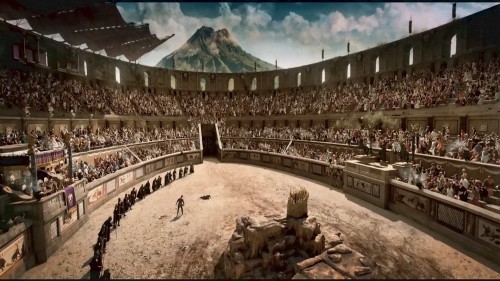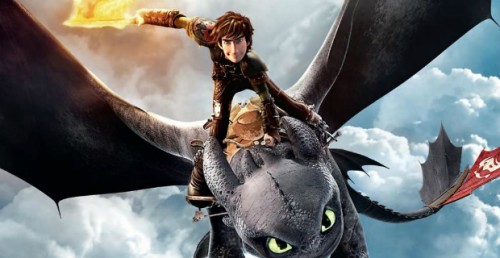By Greg Popil
In 79 A.D., the small Italian villa of Pompeii was completely and utterly obliterated by the eruption of Vesuvius, a massive volcano that buried the town beneath 20 feet of ash and lava. The city was forgotten for nearly 1,500 years, before archaeologists excavated the shockingly well-preserved site, complete with the fossilized remains of ordinary citizens going about their day before meeting a shocking and fairly sudden death. The curiosity evoked by the city’s remains, along with the ambiguity of what exactly happened in an ancient city on the day a natural disaster wiped it off the face of the earth, makes the story perfect fodder for a disaster movie. What’s surprising is that it took this long for the story to be told.
That responsibility falls to director Paul W.S. Anderson. Best known as the director of the seemingly never-ending “Resident Evil” series, Anderson is one of the last of a dying breed, a B-movie grinder who can churn out low-calorie, superficially enjoyable schlock at reasonable budgets. His movies are enjoyed and forgotten with the same amount of ease (his one moment of excellence, the truly horrifying “Event Horizon,” can be viewed as an outlier). Historical fiction, however, brings Anderson into territory well outside his comfort zone.
And so Anderson goes for the oldest B-movie trick in the book: shamelessly rip off bigger movies. “Game of Thrones’” Kit Harrington stars as The Celt (he has no other name for most of the film), who as a young boy saw his entire family slaughtered. He was sold into slavery by the Romans and a life in, you guessed it, the gladiator arena. After dominating in the provinces, the Celt earns his way into the larger arenas in Italy. This part of the movie is so obviously cloned from “Gladiator” that it could sue Ridley Scott’s film for paternity.
From there, we quickly switch to ripping off “Titanic,” as the soulful, penniless Celt uses his kindness and integrity to win the heart of a blandly pretty rich girl Cassia (Emily Browning) returning from Rome to escape the advances of an evil senator. As that villain (who, naturally, is the guy that had the Celt’s entire family murdered), Kiefer Sutherland has one of the two really fun roles in the film, finally taking up the mantle of sniveling, sneering villains that his father Donald has held for decades.
The other fun role belongs to “Lost’s” Adewale Akinnuoye-Agbaje as Atticus, a fellow gladiator set to be pitted against the Celt in a final contest that, should he win, would mean his freedom under Roman law. The Celt and Atticus begin the movie as rivals, but soon learn to respect each other and work together (which is to say, there’s a young white guy and an older black guy, and the older black guy is two days from retirement. Shame, it has no place in the Anderson canon). Akinnuoye-Agbaje brings such charisma to the role that it would not be hard to see an alternate- universe version of this movie with him in the lead.
“Pompeii” dutifully goes through the motions in the first half, using earthquakes as symbolism for the Celt’s simmering resentment of his predicament, and providing an easy paycheck for talented, wasted actors like Carrie-Anne Moss and “Mad Men’s” Jared Harris, until we get to the one-two punch of the climactic gladiator battle and the promised hellfire and brimstone. The former is actually the most fun and intense sequence in the movie; Harrington and Akinnuoye-Agbaje may never be Oscar-winning actors, but they do an excellent job of ramping up the intensity of the battle and bringing an actual sense of stakes to the proceedings. From there, all hell breaks loose, and Anderson can get around to doing what he does best: killing off hundreds of pixilated people.
The massive scale of the eruption sequences allows Anderson to freely indulge in the CGI visuals that can drag down his smaller-scale movies, although it feels like the PG-13 rating was imposed after shooting concluded by cutting into some of the more brutal sequences (the massacre of the Celt’s family seems particularly neutered). This being an historical melodrama, we naturally have to see, and be amused by, secondary characters that would rather engage in combat over silly principles that put aside their differences long enough to outrun the hail of rocks and fire falling from the sky, but all the better to watch them die in all manner of horrific, creative ways.
Near the end of the movie, Cassia asks the Celt, “Is this the end of the world? Why would the gods do this to us?” It’s a fair couple of questions, which the Celt answers by simply staring at her. That more or less sums up how much “Pompeii” has on its mind, but an empty head does not prevent this from being an enjoyable movie. It’s the kind of film that will play for years in the background on TNT while people wash dishes or fold laundry on a rainy afternoon, the cinematic equivalent of a reheated slice of pizza, forgotten as easily as it was enjoyed.
Rating: 48/81




Leave a Reply